Need time to finalize a book manuscript? Research stint at the Polin Institute for theological research within Åbo Akademi University, Finland
The Polin Institute is a growing international center of theological research in Finland. We announce a research stint of maximum six months between the beginning of March 2026 and end of August 2026 for researchers coming from abroad. The scholarship is residential and we expect you to be an active member of our academic community.
Polin monographs-fellowship provides you the following:
-travel costs
-housing
-research infrastructure: desk, internet access, library services, printing, scanning
-monthly tax free (in Finland) scholarship between 2400 and 3000€ depending on your career stage
Eligibility
-all doctors in any field of theology who work to finalize a monograph or other substantial publication within theology
-applicants should come from abroad (Finland-based researchers are not eligible)
Publishing policy
-The Polin Institute is listed as one of your affiliations in publications and presentations that have been substantially worked upon during the time of the stint
-Åbo Akademi University prefers open access publication
Assessment criteria
-your research track record in relation to your career stage
-balance of realism and ambition in your work plan
-the academic quality of your ongoing research and its contribution to academic theology
-relevance of your planned research for the ongoing theological research at the Polin Institute and Åbo Akademi in general
Application should be sent by e-mail to mika.vahakangas@abo.fi by the 31st of August 2025 and contain the following:
-application letter stating how long and when would you wish to stay and whether the dates are flexible or not as well as pointing out how you see your research in relation to the ongoing Polin Institute & Åbo Akademi University research in theology
-work plan of one page
-CV of maximum 3 pages
-list of publications
-a sample chapter and the table of contents or other documentation that facilitates the assessment of the quality of the ongoing research and whether it is realistic to finalize it in the given time
A seminar with Andriy Fert ”Churches and the War-Time ’Spiritual Decolonization’ in Ukraine” that takes place online, 21 January at 9:30am CET (10.30 EET/Finnish time). The meeting will be chaired by Zuzanna Bogumił.
Please register in order to participate https://shorturl.at/1Ilwy
Abstract:
The colonial nature of the subordination of the Ukrainian Orthodox Church to the Patriarch of Moscow came to the fore in the late 2010s, prompted by the state campaign to gain official recognition of ecclesiastical independence from the Russian church administration. Unsurprisingly, with the Russian full-fledged invasion of Ukraine in 2022, the issue of coping with the legacy of Russian colonialism in church matters gained significant relevance for Ukrainian lawmakers and civil society activists. The Ukrainian Orthodox Church (UOC) faced increasing critique for spreading Russian propaganda in the form of religious practices, particularly venerating saints such as Russian emperor Nicolas II and medieval prince Alexander Nevsky or refusing to hold communal prayers in Ukrainian language in lieu of Old Slavonic. This presentation explores rank-and-file church members’ responses to decolonization discourse by focusing on (un)changing saints’ veneration practices and language issues at the grassroots level.
Andriy Fert holds PhD in history; he is the head of the Center for the Study of Religion at Kyiv School of Economics. Recently, he was a research fellow at the Center for East European and International Studies (ZOiS) in Berlin (2023 – 24) and principal investigator for Ukraine in the research project Postsecular Approach to Memory Processes in Central-Eastern Europe (2023–2024). Since 2017, he has been working for the Institute for International Cooperation of the Deutscher Volkshochschul-Verband e.V. (DVV), coordinating projects related to history education in secondary schools in Ukraine. He teaches at Kyiv School of Economics.
About the seminar series:
Series ”Postcolonial perspectives–postdependance entanglements” is organized in frames of two research projects sponsored by the National Science Centre, Poland ”Remembering Soviet repressions in the post-multiple colonial RussianFar East”, no. 2020/39/B/HS6/02809 and SocialMemory and the Post-ImperialRussianHeritage in Poland no. 2021/41/B/HS3/00852.

Polin-institutet får en ny logo från och med början av år 2025. Den nya logon bygger på den förra bekanta röda färgen och symboliserar det lokala genom återkopplingen till Åbo Domkyrkas fönster och dörrar. Samtidigt symboliserar logon det nya genom att antingen betrakta världen genom fönstret eller genom att gå genom dörren.
Logon har designats av grafiska designern Jake Papinaho på Å Communications.
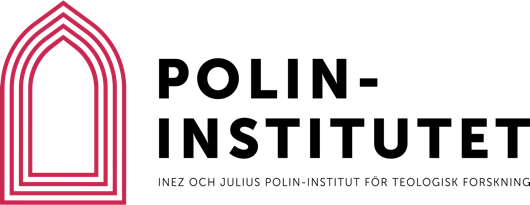
Vår studieresa började lugnt med ta oss från Åbo till det ortodoxa kyrkomuseet Riisa i Kuopio. Sedan startade bussen mot Valamo kloster. Där slogs jag slogs av den välkomnande och lugna atmosfären vid klostret och hela dess omgivning.
Det var tidig väckning (kl. 05:40) för att hinna till morgongudstjänsten, men å andra sidan fick man komma och gå som man ville medan gudstjänsterna pågick. Gudstjänsterna var angenäma, och det var intressant att se hur munkarna bytte av varandra i de pågående recitationerna och sångerna. Man får vara beredd på att stå en hel del, kanske genom hela gudstjänsten, men möjlighet finns också att sitta ner.
Jan-Anders Strandberg
Det var fascinerande att få uppleva hur klosterlivet i Valamo var annorlunda än vad vi fått höra om Athosberget från fader Damaskinos. På Athosberget får munkarna t.ex. bara duscha en gång i veckan och kvinnor är inte välkomna, medan det i Valamo inte finns några sådana regler. Naturligtvis finns även många likheter, som dagliga gudstjänster och löften om fattigdom och lydnad. Jag förväntade mig inte att det skulle finnas en IT-munk i Valamo, eller att munkarna skulle ha Facebook eller gå på gym. En gång om året går Valamomunkarna på pilgrimsfärd till nunneklostret Lintula.
Det jag beundra mest under våran resa var kyrkoarkitekturen. I kyrkorna fanns massor föremål, ikoner och små detaljer. Flesta av kyrkorummen gav en känsla av vördnad och mystik. När vi besökte St. Johannes kyrka var vädret väldigt mulet och grått. När vi kom fram till kyrkan, kom det plötsligt fram igenom det dystra vädret en intensiv ljusblå färg av kyrkans tak och kupoler.
Siri Mathisen
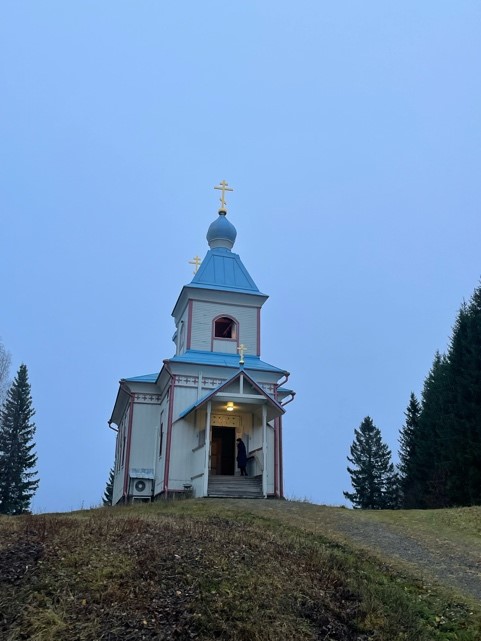
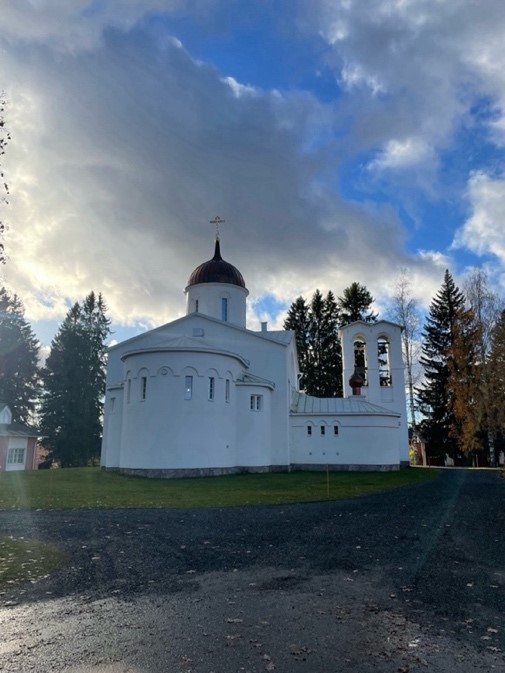
Det jag fann mest intressant under resan var hur djupt vi fick stiga in i den ortodoxa kyrkans tro och liv. Vi fick bekanta oss med klosterlivet i Finland och med flera små församlingar i östra Finland – deras heliga utrymmen, trosutövande och församlingsliv. Vi blev varmt bemötta och fick ställa frågor kring tro, teologi och praxis, medan vi delade gemenskap över en kopp varm dryck.
Tack vare Polin-Institutets finansiering behövde vi inte oroa oss gällande boende eller transport under dagarna. Vi fick fokusera all tid på att vara närvarande och observanta. Det var en bra balans mellan fokuserat praktiskt studium och gemenskapsmåltider. Tack vare bra planering och genomförande hölls gemenskapen och energin på topp, så att vi alltid kunde fokusera väl vid nästa programpunkt.
Förslag: Studieresan gav inte bara mycket ny information, utan också praktisk kunskap som annars varit svår att nå; flera av oss har inte besökt östra Finland eller någon ortodox kyrka tidigare. Dessutom kastade alla våra besök ljus över det vi tidigare tagit del av – i teorin – under de föregående föreläsningarna.
Mezmur Holmström
Må denna text finna er väl i ert läsande, och må denna text fungera som inspiration till dem som tänker sig att gå temakursen i händelse av att den hålls igen!
Vi önskar med detta en fridfull väntan på jul och nyår, och med det frid och fröjd till er!
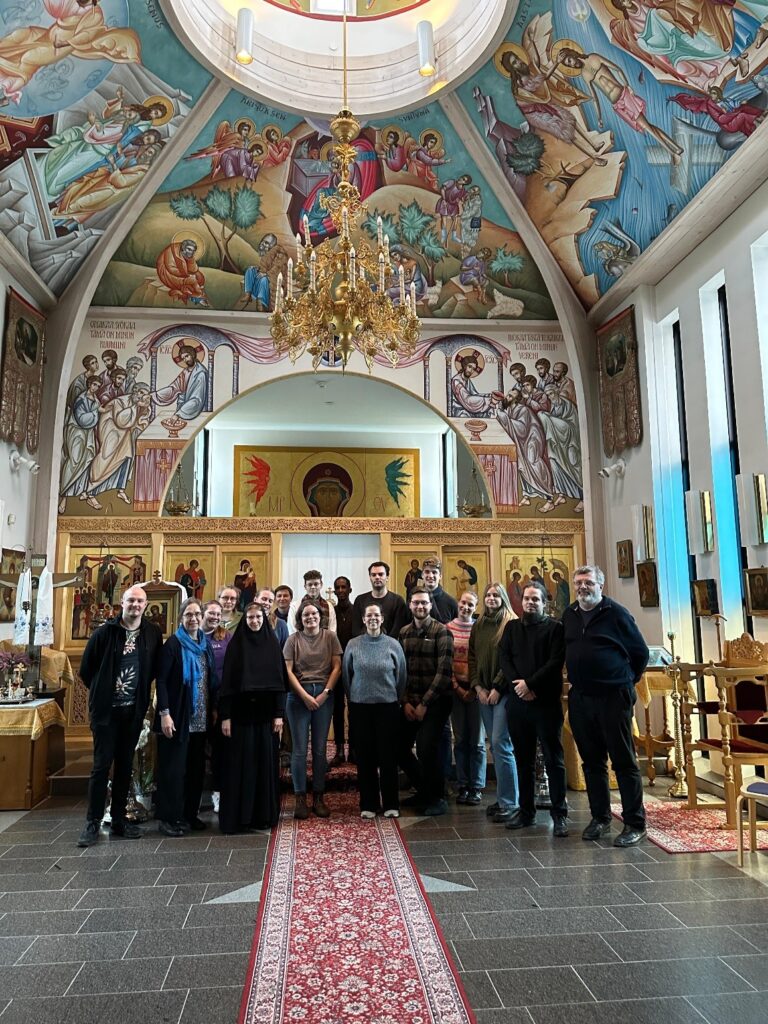
Skribenterna: Mezmur Holmström, Siri Mathisen och Jan-Anders Strandberg
Need time to finalize a book manuscript? Research stint at the Polin Institute for theological research within Åbo Akademi University, Finland
The Polin Institute is a growing international center of theological research in Finland. We announce two research stints of maximum six months between the beginning of September 2025 and the end of February 2026 for researchers coming from abroad.
Polin monographs-fellowship provides you the following:
-travel costs
-housing
-research infrastructure: desk, internet access, library services, printing, scanning
-monthly tax free (in Finland) scholarship between 2400 and 3000€ depending on your career stage
Eligibility
-all doctors in any field of theology who work to finalize a monograph or other substantial publication within theology
-applicants should come from abroad (Finland-based researchers are not eligible)
Publishing policy
-The Polin Institute is mentioned in publications and presentations that have been worked upon during the time of the stint
-The author states the Polin Institute as a scholarly affiliation (double affiliation is fine)
-Åbo Akademi University prefers open access publication
Assessment criteria
-your research track record in relation to your career stage
-balance of realism and ambition in your work plan
-the academic quality of your ongoing research and its contribution to academic theology as well as the quality of the planned publisher
-relevance of your planned research for the ongoing theological research at the Polin Institute and Åbo Akademi in general
Application should be sent by e-mail to mika.vahakangas@abo.fi by the 14th of February 2025 and contain the following:
-application letter stating how long and when would you wish to stay and whether the dates are flexible or not as well as pointing out how you see your research in relation to the ongoing Polin Institute & Åbo Akademi University research in theology
-work plan of one page
-CV of maximum 3 pages
-list of publications
-sample chapter and table of contents or other documentation that facilitates the assessment of the quality of the ongoing research and whether it is realistic to finalize it in the given time
-a publishing agreement or other supporting document from the publisher, if available
Revival Movements in World Christianity: Key Themes and Methodological Issues
An international conference organised by the Polin Institute of Åbo Akademi University in collaboration with the Oxford Centre of Mission Studies, UK.
Helsinki, Finland, 1-4 September 2025
The term revival has been loosely used to refer to various spiritual awakening movements in the history of Christianity. The Biblical narrative on the national restoration of Israel, the seventeenth-century Pietism, the recent spiritual awakening at Asbury in February 2023, and many such events or movements are described as revival. The varieties of these experiences, the differences in their historical period, and the particularity of their cultural location make revival studies in global Christianity dynamic and unpredictable. Several research traditions on revival studies are already in existence along various concepts including Pietism, the Great Awakenings, Methodism, and Balokole. Using such thematic approaches implies separate developments that are circumscribed by regional, linguistic, and confessional borders. Interpretative frameworks such as transatlantic studies, Nordic studies, charismatic studies, and studies on evangelicalism have given some avenues to acknowledge certain interdependencies, transnationality, and the trans-confessional nature of the revival tradition in Christianity. However, revival studies as a global movement remain fragmented and its stories are often lost in the narrative of confessional and institutional histories of Christianity. On the one hand, revivals are global phenomena in Christianity transcending both time and space; on the other hand, revivals are of polynucleated origin and exhibit contextual particularities. Hence, there are traditions within the revival tradition, each providing us with themes and methodological challenges. The conference has a particular interest in bringing together researchers on the various revival traditions into a discussion on key themes and methodological issues in revival studies.
The conference invites papers that explore the historical and cultural developments of the revival tradition in global Christianity and their contribution to Christian practice and thought. Potential themes to explore include but not limited to,
- History of revival movements
- Methods and approaches to revival studies
- Piety and spirituality
- Theology of revival
- Worship and church life
- Ecclesiastical and missional legacy
- Transformation and impact on society
The closer programme of the conference will be prepared later, but the invited esteemed keynote speaker has already been confirmed:
- Kirsteen Kim, Paul E. Pierson Chair in World Christianity, Fuller Theological Seminary, USA
The deadline for the submission of abstract (300 words) was 1 March 2025. The link for the conference registration is found here. Please register by 31 May. The link for submitting your preliminary paper will soon be posted.
The conference will be held at The Cultural Centre and Conference Hotel Sofia, Helsinki, Finland https://www.sofia.fi/en/
The conference fee, 580€, covers accommodation and board during the conference.
Organising committee:
Chongpongmeren Jamir, The Polin Institute, Åbo Akademi University, chongpongmeren.jamir@abo.fi
Marina Ngursangzeli Behera, Oxford Centre for Mission Studies, mbehera@ocms.ac.uk
For any questions or inquiries, please contact Dr. Jamir or Dr. Behera.
Political Theologies of a Democratic Common Life
24-26 March 2025
New College, University of Oxford
Event Description: Religion has a complex role in shaping our political landscape, with the power to either fuel division or serve as a resource for a democratic common life. The fifth Political Theologies conference gathers scholars and practitioners to discuss how religious ideas and communities can foster democratic resilience, uphold the rule of law, and support a diverse, peaceful society. Over three days, we’ll explore critical questions such as:- How can religious groups and symbols help to create common life discourses focused on human dignity, peace, and justice?- What political theologies promote democracy, and which challenge it?- In a polarized world, how can faith communities encourage social empathy, de-polarization, and constructive engagement?
Topics Include:
– Concepts of political and economic democracy, resilience, and pluralism
– Theological and political critiques of authoritarian and anti-democratic ideologies
– Case studies on civic solidarity, rituals of reconciliation, and responses to populism
– The role of religion in fostering a just peace and social empathy
Contributions are welcomed from a variety of disciplines, including theology, religious studies, political science, law, anthropology, and psychology.
Papers engaging political theology from religions beyond Christianity are especially encouraged.
Submission Details: Please send a proposed paper title, a 200-word abstract, and a brief biography to Dr. Marietta van der Tol at mdcv2@cam.ac.uk by 30 November 2024. Decisions will be communicated by 20 December 2024. Short conference briefs (approx. 1,500 words) are due by 1 March 2025.
Limited subsidised accommodation is available for speakers based on need, and travel support may be considered in exceptional circumstances.
Sponsors:This conference is generously sponsored by the Alfred Landecker Foundation, the Inez and Julius Polin Institute for Theological Studies at Åbo Akademi, the Huffington Ecumenical Institute of Loyola Marymount University, and the McDonald Centre at the University of Oxford.
More Information: https://www.divinity.cam.ac.uk/political-theologies-democratic-common-life
Join us as we engage in critical, interdisciplinary discussions on the potential of political theologies to shape a peaceable and vibrant democratic common life. We hope to see you there!
Historical, Contemporary, and Comparative Perspectives
Research conference in Arken, Fabriksgatan 2, Turku/Åbo, 29-30 January 2025
It is our great pleasure to invite you to the first conference in Finland on antisemitism, organized by the Antisemitism Undermining Democracy Project and the Inez and Julius Polin Institute for Theological Research.
In a time where Jewish communities and individuals around the globe encounter with hate, combating and preventing antisemitism is a priority. Actions for combatting antisemitism however cannot be efficiently planned without knowing and understanding the different manifestations of the phenomena in our diverse societies. The objective of this conference therefore is to facilitate the knowledge exchange between researchers and policy makers, and open the dialogue between them as well as the general public in order to increase the possibilities of creating effective counterstrategies against antisemitism.
The conference will take place between the 29– 30 January, 2025 in Åbo (Turku), Finland at the premises of Åbo Akademi University in Finland. The goal of the conference is to promote cross-disciplinary dialogue, and to explore and discuss the phenomena of antisemitism in diverse societies.
We welcome papers that reflect on the social and political implications of antisemitism (both historical and contemporary), including antisemitism in the press, media, and among different groups in diverse societies. We also encourage participants to submit papers connected to antisemitism in historical and contemporary settings, to the effects of antisemitism on education, democracy and democratic values, religious lives of Jewish individuals, as well as papers on proposed methods and good practices in researching as well as in combatting antisemitism.
A final programme of the conference will be prepared later, but the invited esteemed keynote speakers have already been confirmed:
Izabella Tabarovsky (Wilson Center) CANCELLED
Vibeke Moe (Norwegian Center for Holocaust and Minority Studies)
Please register via this link. If you do not wish to present at the conference but would like to attend, please register under the same link until 14th January. Please note that teachers only register here.
Do you have any questions? Please send them to debunkingantisemitism@abo.fi. The conference is held at Arken, Fabriksgatan 2, Åbo Akademi University in Turku (Åbo), Finland.
We are looking forward to seeing you in Åbo / Turku.
Organising committee:
Mercédesz Czimbalmos, Åbo Akademi University
Dóra Pataricza, Åbo Akademi University
Nóra Varga, Åbo Akademi University
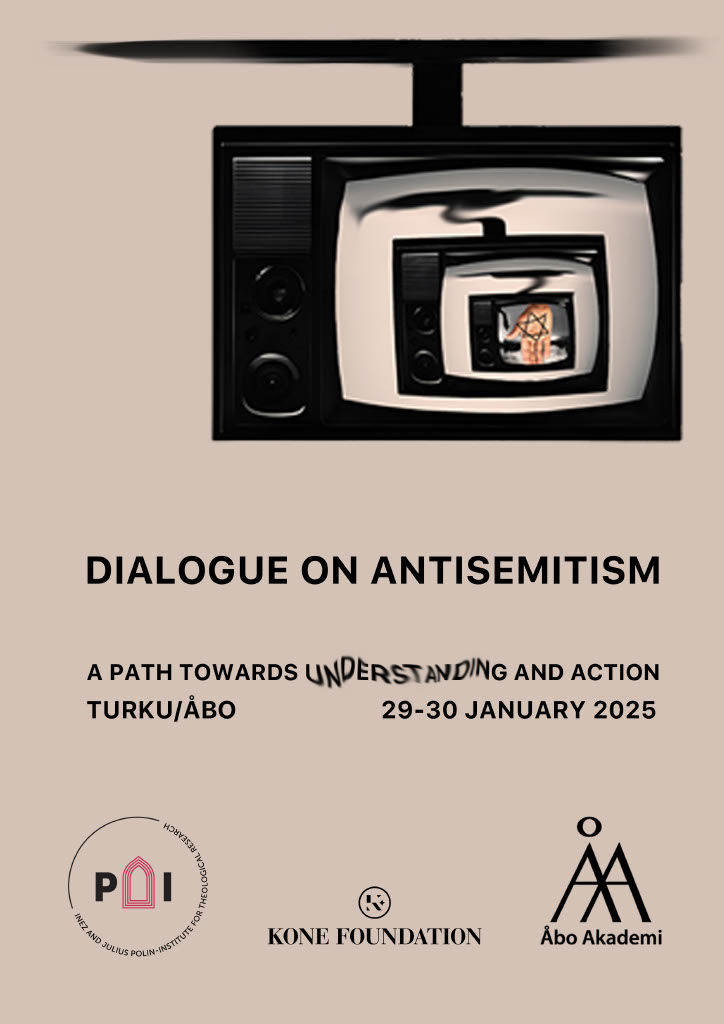
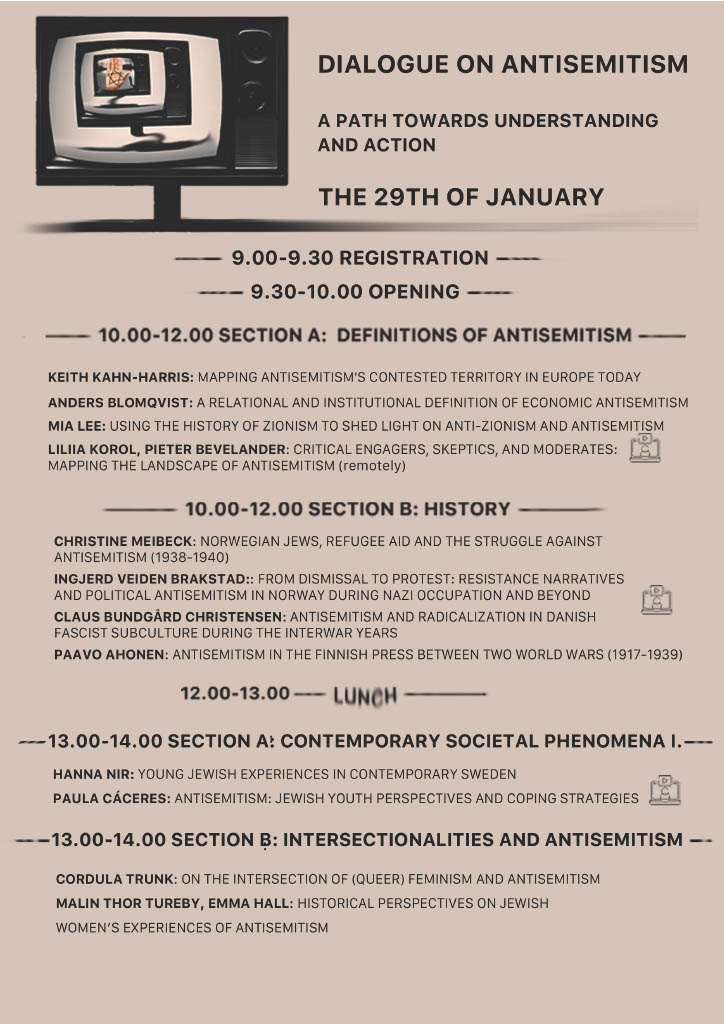


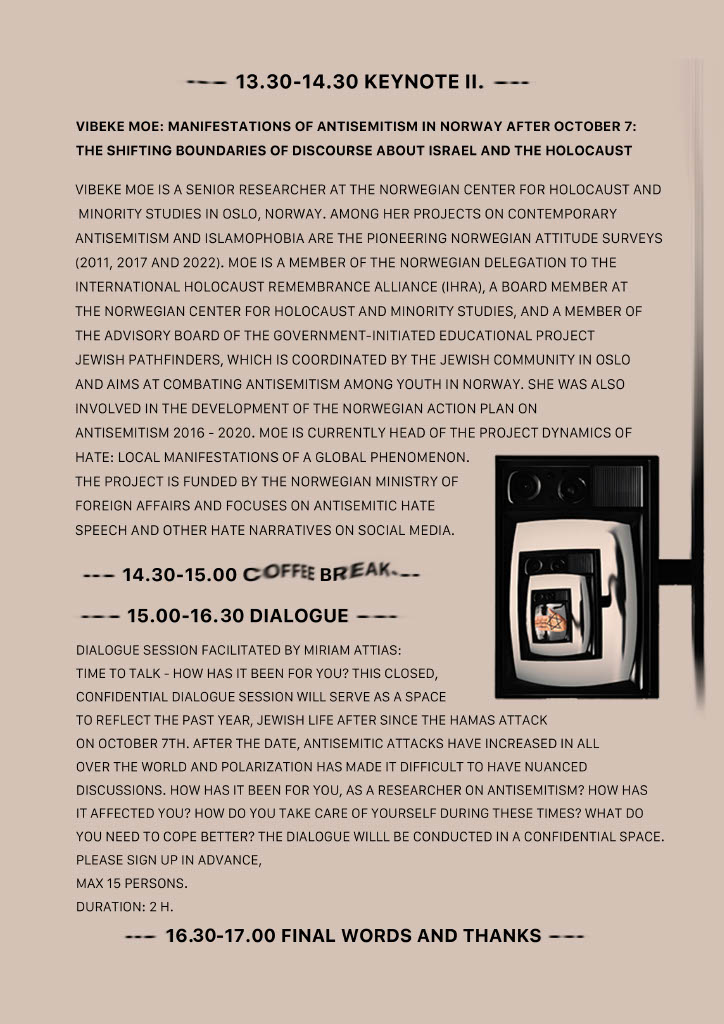
Need time to finalize a book manuscript? Research stint at the Polin Institute for theological research within Åbo Akademi University, Finland
The Polin Institute is a growing international center of theological research in Finland. We announce two research stints of maximum six months between the beginning of March 2025 and the end of August 2025 for researchers coming from abroad.
Polin monographs-fellowship provides you the following:
-travel costs
-housing
-research infrastructure: desk, internet access, library services, printing, scanning
-monthly tax free (in Finland) scholarship between 2400 and 3000€ depending on your career stage
Eligibility
-all doctors in any field of theology who work to finalize a monograph or other substantial publication within theology
-applicants should come from abroad (Finland-based researchers are not eligible)
Publishing policy
-The Polin Institute is mentioned in publications and presentations that have been worked upon during the time of the stint
-Åbo Akademi University prefers open access publication
Assessment criteria
-your research track record in relation to your career stage
-balance of realism and ambition in your work plan
-the academic quality of your ongoing research and its contribution to academic theology
-relevance of your planned research for the ongoing theological research at the Polin Institute and Åbo Akademi in general
Application should be sent by e-mail to mika.vahakangas@abo.fi by the 31st of August 2024 and contain the following:
-application letter stating how long and when would you wish to stay and whether the dates are flexible or not as well as pointing out how you see your research in relation to the ongoing PI & ÅAU research in theology
-work plan of one page
-CV of maximum 3 pages
-list of publications
-sample chapter and table of contents or other documentation that facilitates the assessment of the quality of the ongoing research and whether it is realistic to finalize it in the given time
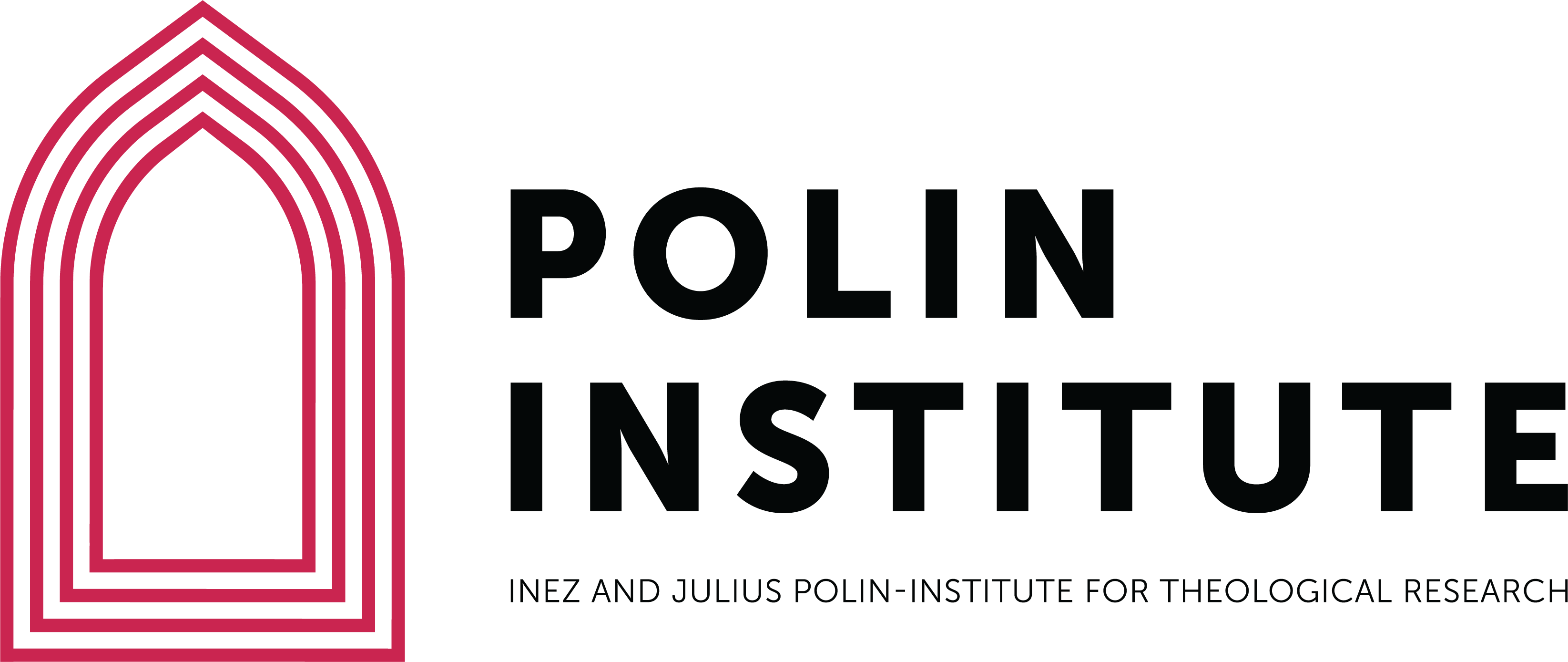
13.06.2025 | Aktuellt
STINT FOR POLIN MONOGRAPH, DEADLINE 31 AUGUST 2025
Need time to finalize a book manuscript? Research stint at the Polin Institute for theological research within Åbo Akademi University, Finland The Polin Institute is a growing international center of theological research in Finland. We announce a research stint of maximum six months between the beginning of March 2026 and end of August 2026 for […]

09.01.2025 | Aktuellt
Seminar with Andriy Fert: Churches and the War-Time ”Spiritual Decolonization” in Ukraine on 21 January, 2025
A seminar with Andriy Fert ”Churches and the War-Time ’Spiritual Decolonization’ in Ukraine” that takes place online, 21 January at 9:30am CET (10.30 EET/Finnish time). The meeting will be chaired by Zuzanna Bogumił. Please register in order to participate https://shorturl.at/1Ilwy Abstract: The colonial nature of the subordination of the Ukrainian Orthodox Church to the Patriarch of Moscow came to […]
02.01.2025 | Aktuellt
Polin-institutet får en ny logo
Polin-institutet får en ny logo från och med början av år 2025. Den nya logon bygger på den förra bekanta röda färgen och symboliserar det lokala genom återkopplingen till Åbo Domkyrkas fönster och dörrar. Samtidigt symboliserar logon det nya genom att antingen betrakta världen genom fönstret eller genom att gå genom dörren. Logon har designats […]

13.12.2024 | Aktuellt
Studieresan i temakursen Ortodoxa kyrkans tro och liv
Vår studieresa började lugnt med ta oss från Åbo till det ortodoxa kyrkomuseet Riisa i Kuopio. Sedan startade bussen mot Valamo kloster. Där slogs jag slogs av den välkomnande och lugna atmosfären vid klostret och hela dess omgivning. Det var tidig väckning (kl. 05:40) för att hinna till morgongudstjänsten, men å andra sidan fick man […]

11.12.2024 | Aktuellt
STINTS FOR POLIN MONOGRAPHS, DEADLINE 14 FEBRUARY 2025
Need time to finalize a book manuscript? Research stint at the Polin Institute for theological research within Åbo Akademi University, Finland The Polin Institute is a growing international center of theological research in Finland. We announce two research stints of maximum six months between the beginning of September 2025 and the end of February 2026 […]

04.12.2024 | Aktuellt
Revival Movements in World Christianity: Key Themes and Methodological Issues
Revival Movements in World Christianity: Key Themes and Methodological Issues An international conference organised by the Polin Institute of Åbo Akademi University in collaboration with the Oxford Centre of Mission Studies, UK. Helsinki, Finland, 1-4 September 2025 The term revival has been loosely used to refer to various spiritual awakening movements in the history of […]

31.10.2024 | Aktuellt
Political Theologies of a Democratic Common Life, CFP deadline 30 November, 2024
Political Theologies of a Democratic Common Life 24-26 March 2025 New College, University of Oxford Event Description: Religion has a complex role in shaping our political landscape, with the power to either fuel division or serve as a resource for a democratic common life. The fifth Political Theologies conference gathers scholars and practitioners to discuss how […]

07.06.2024 | Aktuellt
Dialogue on Antisemitism: A Path Towards Understanding and Action
Historical, Contemporary, and Comparative Perspectives Research conference in Arken, Fabriksgatan 2, Turku/Åbo, 29-30 January 2025 PROGRAM AND ABSTRACTS It is our great pleasure to invite you to the first conference in Finland on antisemitism, organized by the Antisemitism Undermining Democracy Project and the Inez and Julius Polin Institute for Theological Research. In a time where […]

03.06.2024 | Aktuellt
STINTS FOR POLIN MONOGRAPHS, DEADLINE 31 AUGUST 2024
Need time to finalize a book manuscript? Research stint at the Polin Institute for theological research within Åbo Akademi University, Finland The Polin Institute is a growing international center of theological research in Finland. We announce two research stints of maximum six months between the beginning of March 2025 and the end of August 2025 […]

